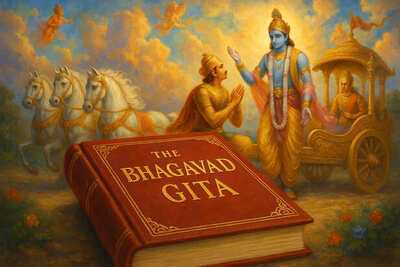
Introduction: The Burden of Expectations
Have you ever felt crushed not by what happened, but by what you thought should happen?
Your friend didn’t text back.
Your boss didn’t appreciate your effort.
Your partner didn’t say what you hoped.
You expected—and you suffered.
 It’s one of life’s most universal patterns. We set up invisible standards for people, moments, and even ourselves, and when reality doesn’t match, pain erupts.
It’s one of life’s most universal patterns. We set up invisible standards for people, moments, and even ourselves, and when reality doesn’t match, pain erupts.
But what if the problem isn’t life, but our habit of expecting?
According to the Bhagavad Gita, this suffering isn’t inevitable. It’s a choice. A deeply conditioned one, yes—but still a choice. And that’s what makes it powerful.
1: The Expectation-Suffering TrapExpectation is often disguised as hope, love, or ambition.
But when it turns rigid, it becomes a trap.
 The Gita explains this clearly in Chapter 2, Verse 62–63:
The Gita explains this clearly in Chapter 2, Verse 62–63:
- From attachment, desire is born.
- From desire, anger arises.
- From anger, delusion arises.
- From delusion, memory is lost.
- From loss of memory, reason is destroyed.
- And with the destruction of reason, one is ruined."
We want something. We cling to an outcome.
When it doesn’t come, we spiral—into frustration, anger, sadness, despair.
Modern translation? We expect. We suffer.
2: Why Do We Expect So Much?
 Expectations often stem from three main roots:
Expectations often stem from three main roots:
1. Desire for Control
We think if we expect something and plan enough, we can prevent pain or ensure pleasure. But life doesn’t follow our script.
2. Validation and Ego
We expect others to behave a certain way to validate our worth. When they don’t, we feel rejected—not because of them, but because of our need.
3. Conditioning
Family, media, and society plant seeds of how things “should be.” We unknowingly inherit expectations that were never ours to begin with.
The Gita whispers gently: These expectations are not truth. They are mental constructs.
3: The Gita’s Cure,Detachment, Not IndifferenceThe Gita doesn’t say “don’t feel” or “don’t love.”
It says: Love deeply, but without clinging. Do your duty, but without attachment.
In Chapter 2, Verse 47, Krishna says:
"You have a right to perform your duty, but not to the fruits thereof."
This is the essence of Karma Yoga—action without expectation.
- Give love, without expecting love back.
- Work hard, without clinging to praise.
- Help others, without demanding gratitude.
It’s liberating. You still care, but you’re free from being controlled by the outcome.
4: Expectations in RelationshipsThis is where most people suffer.
We expect our loved ones to:
- Understand us without explaining.
- Change for us.
- Always agree, always support, always show up.
But the Gita teaches: You are responsible for your emotions, not theirs.
Attachment to people is natural, but expecting them to fulfill your emotional script is a setup for pain.
 Try this instead:
Try this instead:
- Express without expecting.
- Give space for others to be flawed.
- Love people as they are—not as you want them to be.
Even small mindset shifts can change everything.
 Here’s how to start:
Here’s how to start:
1. Notice the Pattern
Ask: “Am I suffering because of the event—or my expectation of it?”
2. Accept Reality
Acceptance isn’t weakness. It’s strength. It says: “This is what is. I’ll deal with it.”
3. Act Without Clinging
Do what feels right, not what guarantees an outcome.
4. Watch the Ego
Much of our pain isn’t from unmet needs, but bruised egos. The Gita constantly warns against this false self.
5. Practice Inner Stillness
Even 10 minutes of meditation or mindful silence can break the mental loop of expectation and reaction.
6: Choosing Peace Over PainPain is often outside your control.
But suffering—that long, sticky, emotional drama we replay—is a choice.
You can choose to expect.
Or you can choose to act, give, love, serve—without clinging.
 You can’t change how others behave.
You can’t change how others behave.
But you can change how tightly you hold on to outcomes.
This is the message Krishna gave to Arjuna on a bloody battlefield.
And it still applies in your relationships, job, family, and day-to-day life.
Final Thoughts: What the Gita Asks of YouThe Gita doesn’t say: “Don’t dream, don’t hope, don’t care.”
It says: “Care, but don’t cling.”
“Give, but don’t expect.”
“Act, but don’t obsess over results.”
When you understand this, something beautiful happens:
You begin to live in freedom, not fear.
In purpose, not pressure.
In peace, not pain.
You stop chasing what should be—and start living what is.
Unlock insightful tips and inspiration on personal growth, productivity, and well-being. Stay motivated and updated with the latest at My Life XP.
Frequently Asked Questions:
No. Detachment in the Gita is about mental freedom, not emotional coldness. You still feel, but you're not enslaved by outcomes.
Start by giving love freely. Express your needs clearly, but don’t link your peace to someone else's response.
-
‘I unhooked her blouse…’: This actress got attracted towards Aishwarya Rai while shooting, her name is…

-
This actress known for her glamorous role, was murdered at 24, her body was discovered after…, her name was…

-
Panchayat season 4 shatters records, becomes India’s most…, its views will shock you

-
Tata Group’s retail arm falls by…, loss from peak by…

-
Meet Nepal’s only billionaire, owns 136 companies, net worth is Rs 154384785180; no match for Mukesh Ambani, Adani, his business is…
